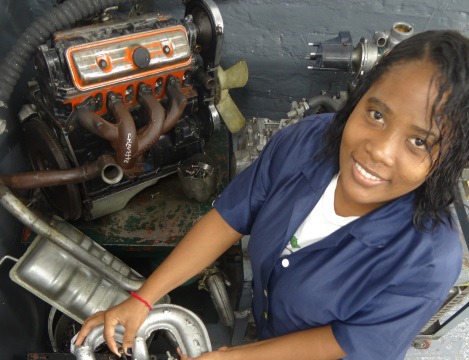
ACIP Job Placement Activity in Cali Opens Doors
Automotive training may not be the first thing that many young women have exposure to, but Hermyleidy Palacios Carabalí isn’t like most young women. Hermyleidy, 24, is one of 408 beneficiaries receiving automotive training through USAID’s Afro-Colombian and Indigenous Program (ACIP).
“Programs like [this] USAID one are so necessary, because they save people that don’t have the financial ability to study. It’s a light at the end of the tunnel. I’m going to be successful in this field and they’ll want to hire me. More than anything, I’m doing it to give my children a better future, and I’m thrilled with the opportunity I’ve been given,” says Hermyleidy.
Youth Job Training Program
This training program, implemented by ACDI/VOCA, offers technical job training with a gender focus to Afro-Colombian and indigenous people in the city of Cali.
The project, which began in January 2013, aims to generate employment for approximately 1,000 of the city’s ethnic minority youth. One of only two women studying auto mechanics, Hermyleidy believes that the opportunities generated by this project will allow her to move to a safer neighborhood and create a better life for her and her two children.
The idea of studying mechanics first occurred to her several years ago. She was returning home with her children and in-laws one night when their car broke down. Her relative, a mechanic, eventually restarted the car, with some help from his wife.
Hermyleidy recalls clearly how the woman “went under the car and fixed it in a minute. A cable had fallen from the motor and it didn’t work. And this woman, under the car with a cell phone, fixed it.”
When the family returned home, she thought, “It’s good to know a little about everything, because you never know what life will throw at you.”
Crucial to Combating Unemployment
So far, she has responded to what life has thrown at her with optimism and ambition. In addition to her studies, Hermyleidy, along with her mother and aunt, runs a foundation that encourages local mothers to pass cultural knowledge to the next generation.
These women, most of whom have never received formal education, act as cultural teachers and work with local musicians to foster peace and denounce the violence that drove many of them from their birthplaces to the Manuela Beltrán neighborhood in Cali’s poor Aguablanca district.
For Hermyleidy, who was born and raised in El Charco, Nariño, but has lived in Cali since 2002, this work is crucial to combating the violence and instability that she views as a product of unemployment (currently 16.4 percent). Cali has Colombia’s sixth highest unemployment rate, according to the National Statistics Department.
She has experienced the effects of unemployment firsthand. While in the past her attempts to find work have rarely succeeded, Hermyleidy believes the work experience she is gaining through the program will make a crucial difference in the future.
The project selected participants through an open application process, and is founded on intensive training. It operates in conjunction with the Ernesto Mejía Amaya Foundation, whose building Hermyleidy visits every week to learn about vacuum systems, alignment, pistons and spark plugs. In the final phase the project will offer job placement assistance.
‘We Have Gender Equality’
“Everyone thinks that mechanics is men’s work, but since we have gender equality and I like challenges, I decided to become a mechanic, because it can help in daily life. Sometimes you take your car to the shop and they charge you a lot of money, when really you just need to change the spark plug,” says Hermyleidy.
Though she makes it sound easy, her knowledge and confidence come from hard work and dedication, both in and out of the classroom.
“She’s a great student with the capacity to succeed in her field,” says María Fernanda Vázquez, the foundation’s project coordinator. “People won’t discriminate against her for being a woman—on the contrary, it will open doors for her.”
Hermyleidy agrees, and, as she divides her time between family, education and the foundation, she feels each day brings her closer to her dream of owning her own auto repair shop and providing a secure future for her children.
Learn more about the Afro-Colombian and Indigenous Program.








